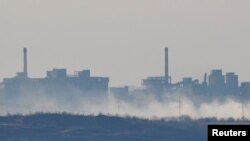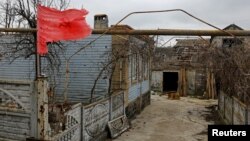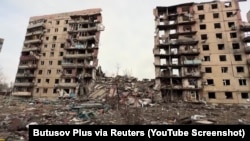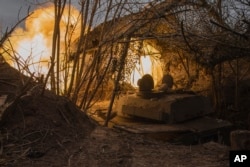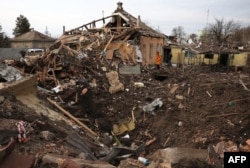Ukraine's military said it is retreating from the southeastern city of Avdiivka amid a Russian barrage, adding that the decision provided no strategic advantage for Russia.
Ukraine's commander-in-chief, Oleksandr Syrskyi, posted on Facebook that the troops were moved "to avoid encirclement and preserve the lives and health of service personnel."
"In a difficult battlefield situation, when only ruins and a pile of broken bricks remain from the fortification, our priority is to save the soldiers' lives," Oleksandr Tarnavskyi, the commander of Ukraine's southeastern sector, wrote on Telegram. He said that Ukrainian units pulled back with minor losses.
Tarnavskyi described the Avdiivka sector as "the hottest" on the entire front line, which stretches about 1,000 kilometers.
Later Friday, Tarnavskyi said that heavy fighting continued and that Russia kept on "practically wiping the city from the face of the earth." He also claimed that on Friday alone Ukrainian forces repelled more than 30 Russian attacks.
A video from Avdiivka, shared by Ukraine's Third Separate Assault Brigade on Friday, shows soldiers taking cover from heavy Russian shelling in the dim dungeons of a large local coking plant, warming themselves and helping the wounded.
Another video shows state border guard soldiers in a badly damaged building, calling the current situation an all-around defense.
Reuters was not able to confirm battleground reports.
Capturing the eastern city is seen as key to Moscow's aim of securing full control of the two provinces that make up the industrial Donbas region and could hand Russian President Vladimir Putin, who recently underlined its significance, a battlefield victory as he seeks reelection next month.
'The clock is ticking'
During a White House press briefing, U.S. President Joe Biden stressed the significance of continuing U.S. military support for Ukraine against Russia and noted that though a bipartisan Senate voted in favor of funding Ukraine's war against Russia, the House of Representatives has not yet done so.
"History is watching the House of Representatives. That failure to support Ukraine at this critical moment will never be forgotten. It's going to go down the pages of history. It really is, it's consequential. The clock is ticking. And this has to happen. We have to help now. You know, we have to realize what we're dealing with," Biden said.
Meanwhile, Ukrainian President Volodymyr Zelenskyy signed a new long-term security pact with France on Friday, calling it "an ambitious, very substantive security agreement."
"This is not an alternative to the United States. We are all together, and this union is necessary to defeat Russia," Zelenskyy told reporters alongside French President Emmanuel Macron.
The 10-year security pact with France includes commitments by Paris to deliver more arms, train soldiers and send up to $3.2 billion (3 billion euros) in military aid to Ukraine in 2024.
"Our commitment to Ukraine will not weaken," Macron told a joint news conference, adding that the "Kremlin regime" had entered a new phase that was now clearly showing more aggression toward European countries.
"By helping our Ukrainian partner, we are investing in our security," said the French president.
Ukraine, Germany sign pact
Earlier Friday, during a visit to Berlin, the Ukrainian president and his German counterpart, Chancellor Olaf Scholz, signed a similar 10-year security pact ensuring Germany's continuing military support of Ukraine. Berlin also committed to sanctions and export controls against Russia and to keeping Russian assets frozen.
"The document's importance cannot be overestimated. It makes clear that Germany will continue to support an independent Ukraine in its defense against the Russian invasion," Scholz said. "And if in the future there is another Russian aggression, we have agreed on detailed diplomatic, economic and military support."
Berlin also has prepared another immediate military aid package worth $1.2 billion that includes 36 howitzers, 120,000 rounds of artillery ammunition, and two more air-defense systems.
Scholz described the long-term security accord as a "historic step." It's Ukraine's second such bilateral agreement after one signed last month with Britain.
The meetings came amid a flurry of international gatherings this week, including the Munich Security Conference on Saturday that Zelenskyy is scheduled to attend.
Several bilateral meetings on the sidelines are planned, including with U.S. Vice President Kamala Harris.
Russia has fired at least 24 North Korean ballistic missiles at Ukraine since December 30, in strikes that have killed at least 14 civilians, Ukraine said Friday in a preliminary assessment.
Andriy Kostin, Ukraine's prosecutor general, said Kyiv had preliminarily identified the ballistic missiles as the North Korean KN-23/24, adding that of the 24 missiles fired, only two had been "relatively" accurate.
"The accuracy of the missiles is questionable," he said.
Ukraine said Thursday a wave of Russian missiles targeted several Ukrainian regions, while in the Russian city of Belgorod officials said a Ukrainian attack killed at least five people.
Vyacheslav Gladkov, the Belgorod regional governor, said another 18 people were hurt in the Ukrainian attack.
Russia's Defense Ministry reported destroying 14 rockets in the Belgorod area, which is near the border with Ukraine and has been the site of repeated Ukrainian attacks.
Ukrainian officials said the Russian missiles fired Thursday killed at least seven people and damaged multiple buildings. A following attack killed four more people.
Officials in the city of Zaporizhzhia reported four people wounded, with damage to a school and a shop from the Russian attack.
Russian missiles also targeted the Ukrainian capital, Kyiv, where officials said air defenses were able to shoot down all the missiles and that there were no reported injuries.
Some information for this report came from The Associated Press, Agence France-Presse and Reuters.




